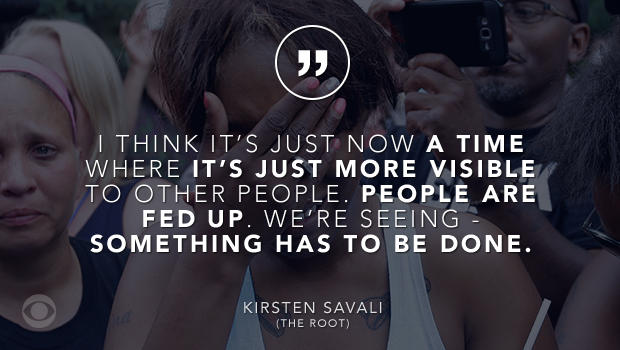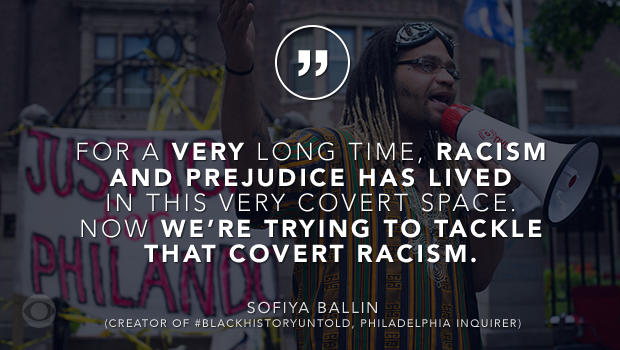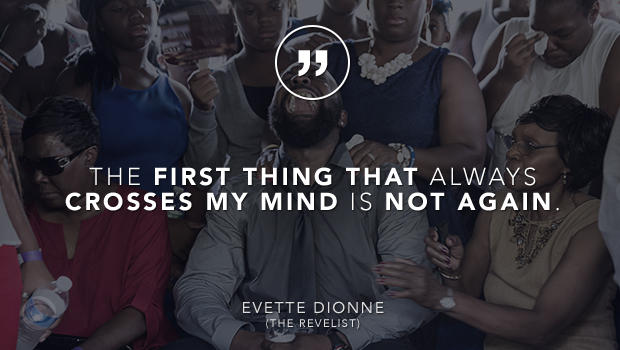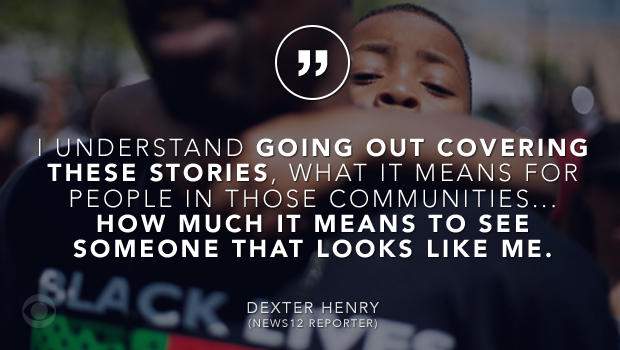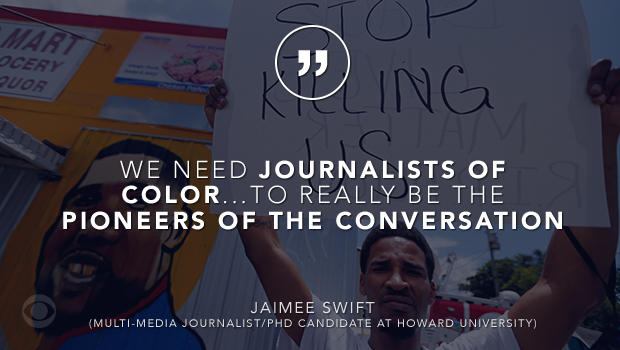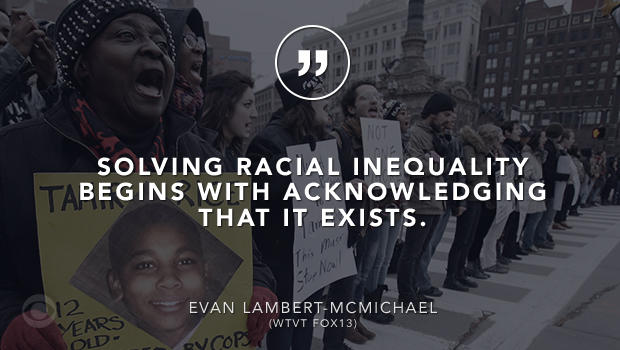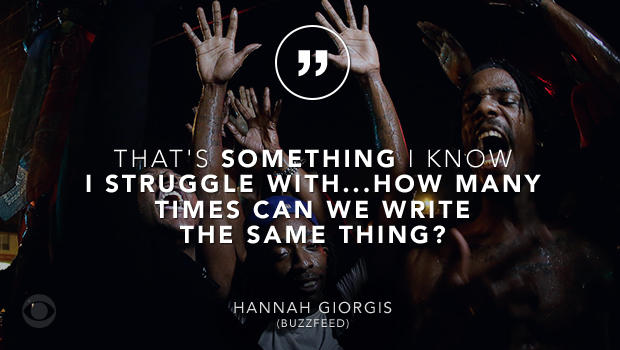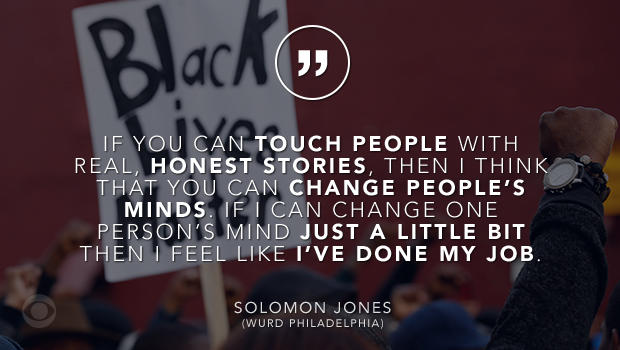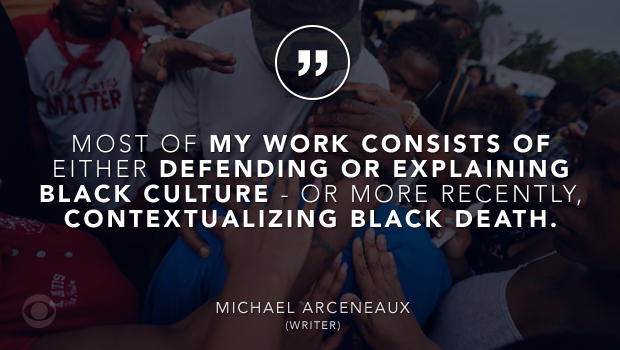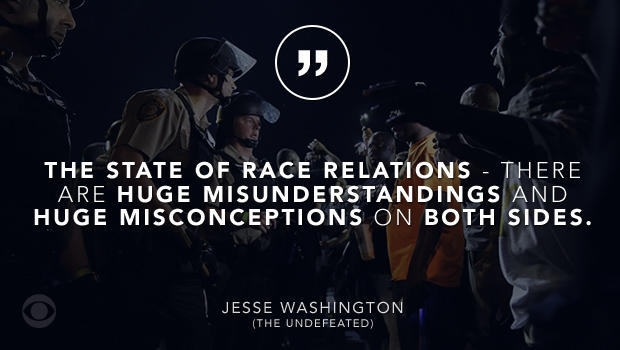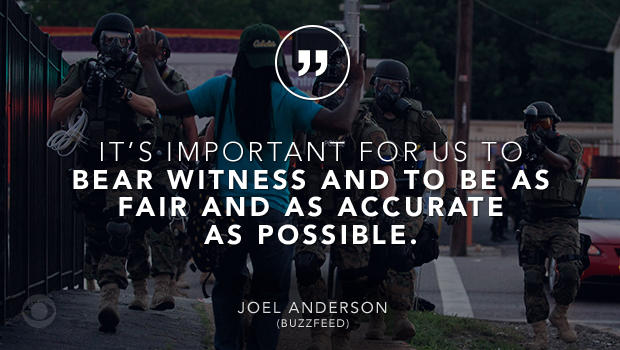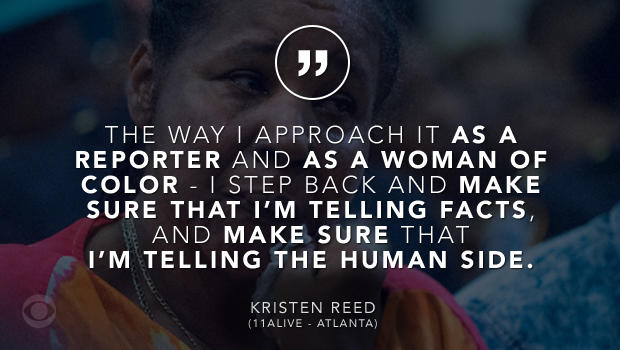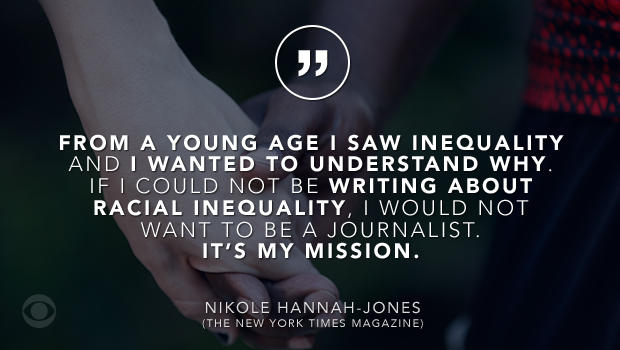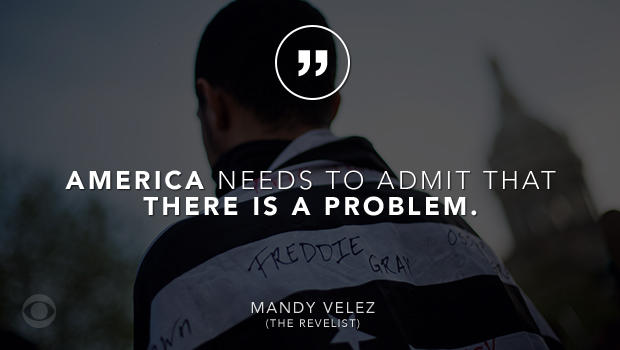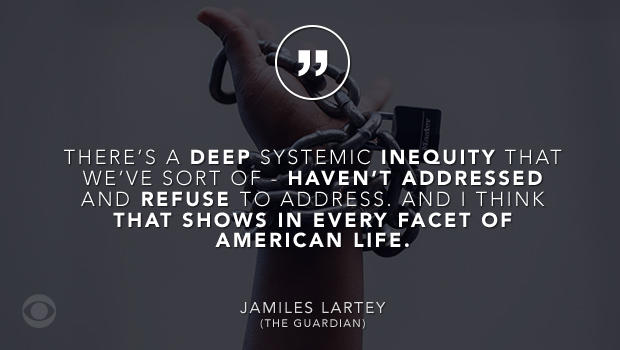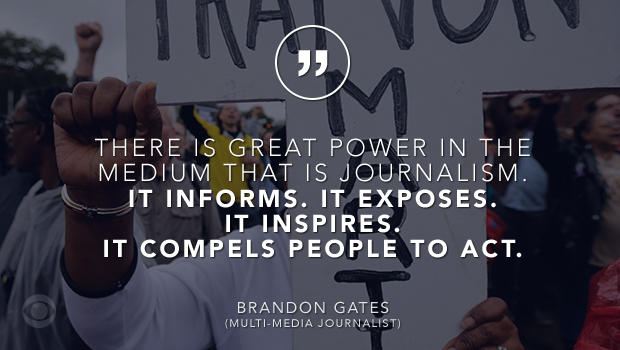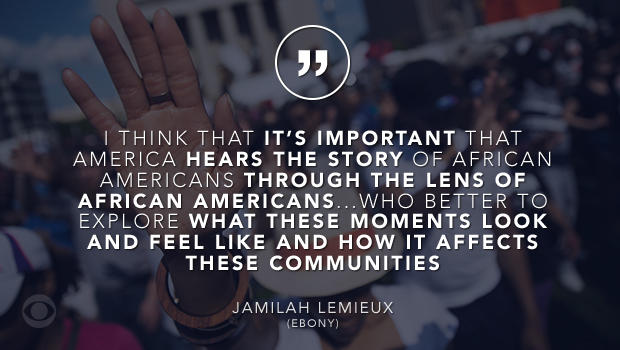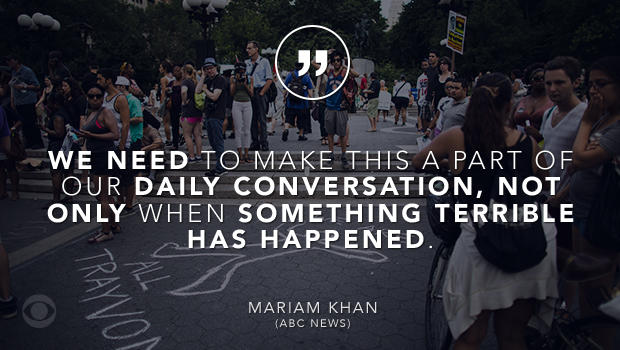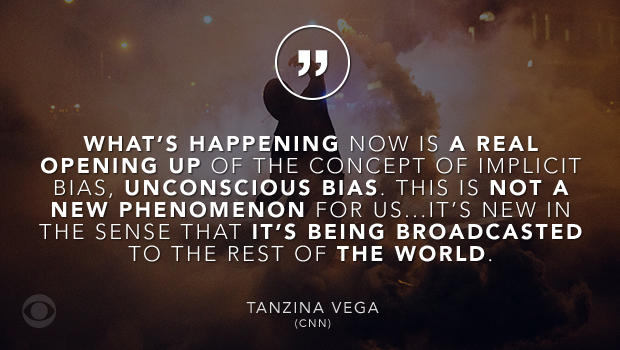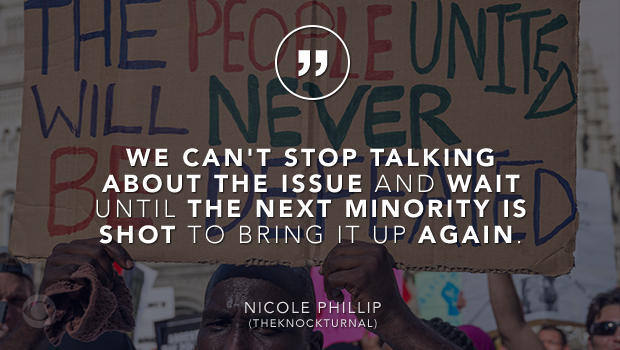Reporters on race
A journalist's job is to objectively peel back the layers of complex stories and shed light on truths beyond the the headlines. But what happens when the story taps into the core of who a reporter is?
In light of recent tragedies that have placed race relations and police-involved shootings at the forefront of American conversations, CBS News' Rhonda Elnaggar spoke with journalists of color about the challenges they face while reporting on stories about race in America.
Kirsten Savali
Associate editor at The Root, covering culture, social justice and education.
"I think it's just now a time where it's just more visible to other people. People are fed up. We're seeing - something has to be done.
We can talk about change and change and change, but we still have the same systems in place. How much change will there be?
For me, I cannot be quiet. I have to be very mindful of the line between professionalism and activism, and what I can and cannot say. But it's been very difficult, it just never stops."
(In this photo, Diamond Reynolds, the girlfriend of Philando Castile, cries outside the governor's residence in St. Paul, Minn., on July 7, 2016, the day after Castile was shot and killed by police during a traffic stop.)
Sofiya Ballin
Arts and entertainment writer at The Philadelphia Inquirer; creator of #BlackHistoryUntold.
"For a very long time, racism and prejudice has lived in this very covert space. Now we're trying to tackle that covert racism.
I'm seeing it literally from the black person's perspective and the black person's vantage point. So I understand why it's important for me to be there. And that's why I feel a sense of responsibility to be there. But at the same time it's very hard.
So when I know I have that responsibility, I say - I need to check this out. And not only do you have to check this out and read about it, you have to watch that video five times. You have to analyze it, you have to critique it. You have to put it into historical context. And that becomes draining."
(In this photo taken on July 8, 2016, Curtis Avent addresses demonstrators in St. Paul, Minnesota, who were protesting the police shooting death of Philando Castile.)
Evette Dionne
Senior news and identity editor at The Revelist.
"The first thing that always crosses my mind is, 'not again.'
My heart sinks. It feels like a perpetual cycle. We're doing this over and over and over again. My first step is to always find out the facts, reach out to the police department, the mayor's office - and I start piecing the story together. Now, because of social media, we are able to see this in real time, and it's making the impact immediate. I would tell anybody that the system is broken, that it's always been broken, and we are just now being able to touch and quantify the impact of that.
Race reporters bear witness to the world's atrocities, and keep record of it for current and future generations to behold, which is why it's so important."
(In this photo, Michael Brown Sr., cries out as his son Michael is buried on Aug. 25, 2014. The 18-year-old shot and killed by a police officer in Ferguson, Mo., setting off weeks of protests.)
Dexter Henry
News12 reporter for the Bronx, covering news and sports.
"Sometimes, even as journalists, we're supposed to be objective, and we do our best doing that - I understand going out covering these stories, what it means for people in those communities, being a black man and those people tell me when I go to cover these stories, how much it means to see someone that looks like me. Helping them being a voice, and helping their stories being told - about what's going on.
It's also inspirational for people - younger generations, people of color - to see that. And to see black and brown journalists, telling stories that might not be told in the mainstream [media] all of the time."
(In this photo taken May 2, 2015, Devonte Reed, 5, looks over the shoulder of James Watson at a demonstration in Baltimore the day after charges were announced against the police officers involved in Freddie Gray's death.)
Jaimee Swift
Multimedia journalist and PhD candidate at Howard University; published in The Huffington Post, Salon, The Grio and other outlets.
"I actually do believe that race reporting, or race-based reporting, has catalyzed this major movement.
We have to tell our own stories. It's important because we need journalists of color, black journalists, to really be the pioneers of the conversation.
And I think all journalists run off emotion, so I think that we can't lose that in our reporting. Without emotion, we would not be able to write these poignant pieces about what's going on."
(In this photo, a man holds a sign in front of a mural of Alton Sterling in front of the Triple S Food Mart in Baton Rouge, La., on July 7, 2016. Sterling, 37, was shot and killed outside the convenience store by Baton Rouge police while he was selling CDs.)
Evan Lambert-McMichael
Reporter at WTVT FOX13 in Tampa, Florida.
"Solving racial inequality begins with acknowledging that it exists.
Reporting on race issues helps people who may not experience racism directly empathize and take action or learn from the experiences of others. It should not take more killings for people to acknowledge that bias exists in our criminal justice system - but exposing the inequities is our duty as reporters and especially as reporters of color.
I see one of the most important roles of a journalist as being able to relate to people based on our shared experiences as humans. Trust comes from authenticity and being authentic is how I build trust with those whose stories I tell and my audiences."
(In this photo, demonstrators block Public Square in Cleveland, Ohio, during a protest over the police shooting death of 12-year-old Tamir Rice, who was shot by a white police officer while playing with a pellet gun on Nov. 22 2014.)
Hannah Giorgis
Culture and style writer at BuzzFeed. Penned "How Many Black People Can You Mourn In One Week?" after the deaths of Alton Sterling and Philando Castile.
"Anytime you're thinking about journalism, you're thinking about stories that are about human beings. At the end of the day, we're talking about real human beings whose lives are affected in real meaningful ways. I think that being able to step into the human feeling behind that is always an important skill to have as a reporter, as a journalist, as a writer.
And I think that's something that I know I struggle with and a lot of other black friends who are writers struggle with. How many times can we write the same thing?
(In this photo taken Aug. 17, 2014, people defy a curfew before smoke and tear gas were fired to disperse a crowd protesting the shooting of Michael Brown in Ferguson, Mo.)
Solomon Jones
Best-selling author, columnist for the Philadelphia Daily News, and radio host for 900 WURD.
"It's important for us, when we have the opportunity and when we have the platform to tell our own stories in our own voices. To be authentic in sharing our perspective based on our experience in those stories.
Stories change minds and stories change hearts - stories can change circumstances if they are real and if they are authentic. If you can touch people with real, honest stories, then I think that you can change people's minds. If I can change one person's mind just a little bit then I feel like I've done my job.
The hardest part for me is seeing the videos, seeing the death, seeing the loss over and over again. I grieve every time."
(In this photo taken April 22, 2015, demonstrators in Baltimore protest the death of Freddie Gray, who died from spinal injuries after he was arrested and transported in a police van.)
Michael Arceneaux
Writer published in EBONY magazine, Complex magazine, The New York Times, BuzzFeed, Mic.com, NPR's Code Switch, Rolling Stone, The Washington Post and others.
"This country's original sin is racism, but it's a cancer that's only been treated, not cured.
It's really emotionally draining, even for someone who tries not to bring their emotions into their work - to not do that anymore. These people look like me. It's hard enough to be a working writer, but to have to talk about this over and over again, I literally sometimes don't know what to say.
Most of my work consists of either defending or explaining black culture or more recently, contextualizing black death."
(In this photo, Cameron Sterling, 15-year-old son of Alton Sterling, is comforted at a vigil outside the convenience store in Baton Rouge, La., where his father was killed by police.)
Jesse Washington
Senior writer for ESPN's The Undefeated, covering race and culture.
"I don't think that the state of race relations is good. I think it's poor. I think there are huge misunderstandings and huge misconceptions on both sides. And I think there is little willingness to challenge our own beliefs.
I'm in this business not for likes or followers or clicks, but really to explain to people - to explain to people what's actually going on. I feel that that's our role as journalists.
One of the highest compliments on my work and one of the things that is most gratifying to me is when people say, 'I had never thought of that before,' or 'I never knew that,' or 'You explained something to me in a way that I had never considered.' And I think that's what our job is."
(In this photo, police and protesters face off in Ferguson, Mo., on Aug. 10, 2015. The mood was tense one day after a protest marking the first anniversary of Michael Brown's death)
Joel Anderson
National reporter at BuzzFeed.
"It's important for us to bear witness and to be as fair and as accurate as possible.
What I think about when I get ready to go is, what story am I going to tell that nobody else is going to tell? That's one of my first thoughts. And the second is, what's the context for this - what sort of history is there in this city of police violence, of police brutality, racial division, segregation, like all these sorts of things that can inform attentions that arise around these sorts of stories.
I'm like, OK, I've got to do this, how am I going to do this? I don't get overly emotional about this or personalize it too much by the time I've been assigned that story or know that I'm going - because I know that I have a job to do."
(In this photo, police wearing riot gear walk toward a man with his hands raised in Ferguson, Mo., on Aug 11, 2014.)
Kristen Reed
Digital producer at 11Alive, the NBC station in Atlanta, Georgia.
"The way that I approach it as a reporter and as a woman of color is, I kind of step back and make sure I'm telling facts. And make sure that I'm telling the human side.
America needs to do a lot more listening with the intent of understanding. If they did they would realize this is a really big problem that affects everyone. It's a real problem. My feelings are - what's next if nothing changes?"
(In this photo, Esaw Snipes, widow of Eric Garner, wipes tears during a memorial service for her husband on July 14, 2015. A year earlier, Garner died while being taken into custody by New York City police officers.)
Nikole Hannah-Jones
An investigative reporter covering social justice and racial inequality for The New York Times Magazine.
"The only reason why I ever became a journalist was to write these stories. I knew that - looking at my own community, my own family, my own friends, that a lot of the stereotypes we saw in the media weren't true. And I wanted to understand where they came from and why things are the way they are.
And that's driven me to do this type of reporting my whole life. I think from a young age I saw inequality and I wanted to understand why. If I could not be writing about racial inequality, I would not want to be a journalist. It's my mission. It's not just a job, it's my mission.
You cannot cover America without covering racial inequality... There's no aspect of our society that you don't see racial inequality."
(In this photo, people hold hands at a candlelight vigil for Baton Rouge police officer Montrell Jackson on July 19, 2016. Jackson was one of three Baton Rouge officers shot and killed in an ambush two days earlier.)
Mandy Velez
Editorial director/co-founder at The Revelist.
"When you're covering these stories, the same ones in a sense, over and over, you think why - why are we saying the same things over and over again and nothing is changing? It's a mixture between frustration and complacency - and that comes from the sense that you know where the narrative is going to go and still having to write about it anyway.
America needs to admit that there is a problem."
(In this photo, a protester wears a flag decorated with the name of Freddie Gray during a demonstration outside Baltimore City Hall on April 29, 2015.)
Jamiles Lartey
Reporter for The Guardian US, covering mostly criminal justice, policing and race. Also one of the journalists behind "The Counted," an investigative report of all police killings in 2015.
"Your first goal in every story is always the truth. What happened. Objectively what is true about what you're reporting. Then finding the nuance. Not just telling it in the simplest way possible but making sure that there are a variety of perspectives that are being entertained, and kind of walking people through them.
In most situations there's more than one point of view. There's more than one perspective and they're all valid.
There's a deep systemic inequity that we've sort of - haven't addressed and refuse to address. And I think that shows in every facet of American life. If race influences our lives in all of these different ways then we need to be reporting on it. It's the same way in the way economics do, or gender does or religion does."
(In this photo, Black Lives Matter protesters march in Philadelphia on July 26, 2016, during the Democratic National Convention.)
Brandon Gates
Multimedia journalist and writer based in New York City.
"There is great power in the medium that is journalism. It informs. It exposes. It inspires. It compels people to act.
It's, first, important to have as much information as possible when these things break. As a person of color you always want to react like, 'Oh my God another one? Not again.' But then you have to remember that you are a journalist, so you can't just react quickly, as quickly as other people. You want to react and you want to say, 'I can't believe this police officer shot another unarmed black man' - but there are always discrepancies in the story so you do have to make sure you have as many facts as possible before you react.
The only way we will ever achieve unity is through a willingness to consider other points of views and other experiences. We should be active participants in government and community and not just passive witnesses."
(In this photo, a protester carries a cross with the name of Trayvon Martin during a march in Ferguson, Mo., on Oct. 13, 2014.)
Jamilah Lemieux
Senior editor at EBONY magazine.
"The news cycle over the past few years has been deeply emotional and challenging. I'm a black woman in the United States so I couldn't escape these stories if I wanted to.
I also feel like I have an obligation to help translate black grief and frustration to a diverse audience, an audience that's primarily African-American, but includes people of all races and colors.
We're all informed by our experiences, and that goes for the opinion writers and the traditional, quote unquote 'unbiased journalists' - we're all operating with certain biases and experiences. I think that it's important that America hears the story of African-Americans through the lens of African-Americans.
Who better to explore what these moments look and feel like, and how it affects these communities?"
(In this photo, people pray during a rally calling for justice for Freddie Gray at Baltimore City Hall on May 3, 2015.)
Mariam Khan
Digital journalist with ABC News, based in Washington, D.C.
"So much focus and attention is on race and culture and identity in this country. We need to make this a part of our daily conversation, not only when something terrible has happened.
As reporters and journalists we need to have empathy in anything that we cover because it really helps give you perspective. If they're a different religion, color, gender identity - as long as we're opening ourselves to the people or the issue that we're trying to discuss, it only helps us better understand, what it is we're trying to share with the rest of the world.
As reporters that's what we're trying to do - to help enlighten and educate and shine light on certain things. So when you're reporting a story about such intense topics such as race and culture, it's - it's something that empathy plays a huge part in."
(In this photo, protesters converge on New York's Union Square on July 14, 2013, after the acquittal of neighborhood watch volunteer George Zimmerman in the 2012 killing of 17-year-old Trayvon Martin in Sanford, Fla.)
Tanzina Vega
National reporter at CNNMoney, where she covers race and inequality in America.
"So for a lot of people, I think a lot of Americans, if you ask them directly, 'Are you racist?' many people would say 'absolutely not,' because we want to assume in many ways that we have moved past a lot of these conversations. And in some ways we have, and in some ways we haven't.
What's happening now is a real opening up of the concept of implicit bias. Unconscious bias. This is not a new phenomenon for us, it's new in the sense that it's being broadcasted to the rest of the world.
These prejudices and stereotypes in many ways are embedded deep, deep, deep in the crevices of our minds and they still play out on a personal, interpersonal level and they still play out on an institutional level."
(In this photo taken April 28, 2015, a protester throws a tear gas canister back toward police after a 10 p.m. curfew went into effect in the wake of riots following the funeral for Freddie Gray in Baltimore.)
Nicole Phillip
Multimedia journalist with TheKnockturnal.
"It's kind of difficult to figure out - how do I want to start writing this. You don't want to alienate any of your audiences, because then it's almost like a disservice because you want other people to be enlightened on the subject.
It's important to continue to write about these issues. We can't stop talking about the issue and wait until the next minority is shot to bring it up again. When we work in this 24/7 news cycle, things get pushed aside too quickly. We move on to the next thing too fast.
We have the power to expose scandals - so when it comes to [these] situations, I feel like the news plays one of the biggest roles. Because we investigate."
(In this photo, protesters demanding an end to police brutality march in Philadelphia during the Democratic National Convention, July 26, 2016.)

